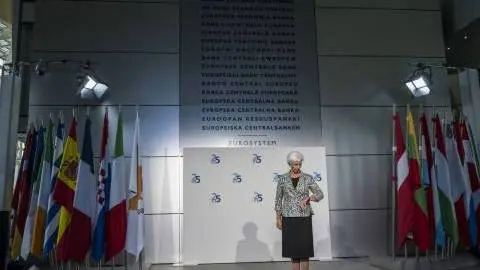What you need to know about June’s European elections
The outcome of the European elections could delay future decision-making but will not derail the European economy
With less than one month to go, the European elections are in full swing. Coverage of, and attention to these elections has clearly increased over the last couple of decades. Nevertheless, the actual turnout - despite some increase over the last few years – still significantly lags behind voter turnout at national elections. In 2019, the last time these polls were run, only slightly more than 50% of the electorate came to the ballot box.
This year, the elections will take place from 6-9 June. At the next European Summit at the end of that month, national heads of state are likely to select a candidate for the European Commission presidency. The formal election of the next Commission president will likely happen in the mid-September session of the European Parliament.
This short article is not the place to underline the importance of Europe and the impact of Europe on businesses and people every day. But it is the place to briefly answer the three most important questions regarding the economic implications. In contrast to the US presidential elections, the economic impact of European elections will be more gradual. Even if their powers have increased over recent years, neither the European Commission nor the European Parliament has the same discretionary power as the US president.
The potential impact of an expected shift to the political right in Europe
In recent national elections, several European countries have already seen a shift towards the political right. According to the polls, the European elections could see further gains for populist parties, partly as European elections are often seen as a good occasion for protest votes but partly also as a simple result of national trends. However, a recent drop in the polls for the German AfD party indicates how fragile and volatile support for anti-European parties can be.
As symbolic as any gains for anti-European parties would be, there wouldn’t be any imminent direct implications on the economy. First of all, populist and anti-European parties have, up to now, not been able to work together in the European Parliament. The character, membership and number of groups can change and have changed over the years. For anti-European and populist parties to block some of the EU’s procedures (e.g. the rule of law mechanism) they would need to act as a unified block and achieve more than one-third of the seats in the next Parliament. They could then influence the shape of new legislation if the other mainstream parties were divided. Currently, a still unlikely scenario. In fact, even after the elections, the more disruptive potential of populist parties will be much higher via the Council (and national governments) than via the European Parliament.
Still, decision-making could become more complex in a more fragmented European Parliament, particularly as the EP and the Council jointly adopt most EU laws. As a result, the impact of any gains by anti-European parties will not derail the European economy, but it will further complicate new investment initiatives or cross-border reforms and endeavours.
What to expect from the next European Commission
Remember that even if the largest political group in the European Parliament has a good chance to propose the President of the next European Commission, it is government leaders who make the final decision. Currently, polls suggest a second Ursula von der Leyen Commission to be the most likely outcome, but von der Leyen herself experienced in 2019 how a 'dark horse' can suddenly become president. A second term is by no means a given, and that's perhaps underlined by recent rumours that the former ECB Chief Mario Draghi could be put forward by Emmanuel Macron as president of the EC.
As for the so-called strategic agenda of the next European Commission, it looks for now that these issues will top the list:
- strategic autonomy, competitiveness and defence,
- further EU enlargement, and
- implementing rather than enhancing the Green Deal.
The European Commission has exclusive competencies in policy areas such as trade agreements, competition rules within the single market, and the customs union. The Commission's role in trade agreements could particularly gain more importance after the US presidential elections.
The recently agreed revised fiscal rules have opened the door to more flexibility and tailor-made approaches, giving the European Commission more power vis-à-vis the member states. The timing of the European elections has already delayed measures to control fiscal deficits that are too high. The European Commission will only publish its assessment of the latest fiscal plans after the elections.
We expect the EC to launch so-called Excessive Deficit Procedures for several countries, including France, Italy and Spain. The political process, however, will clearly last into the autumn. As a result, fiscal policy in the eurozone as a whole is likely to become more restrictive in 2025.
This publication has been prepared by ING solely for information purposes irrespective of a particular user's means, financial situation or investment objectives. The information does not constitute investment recommendation, and nor is it investment, legal or tax advice or an offer or solicitation to purchase or sell any financial instrument. Read more
Tags
EurozoneDownload
Download article
9 May 2024
ING Monthly: I wanna dance with somebody This bundle contains 14 Articles